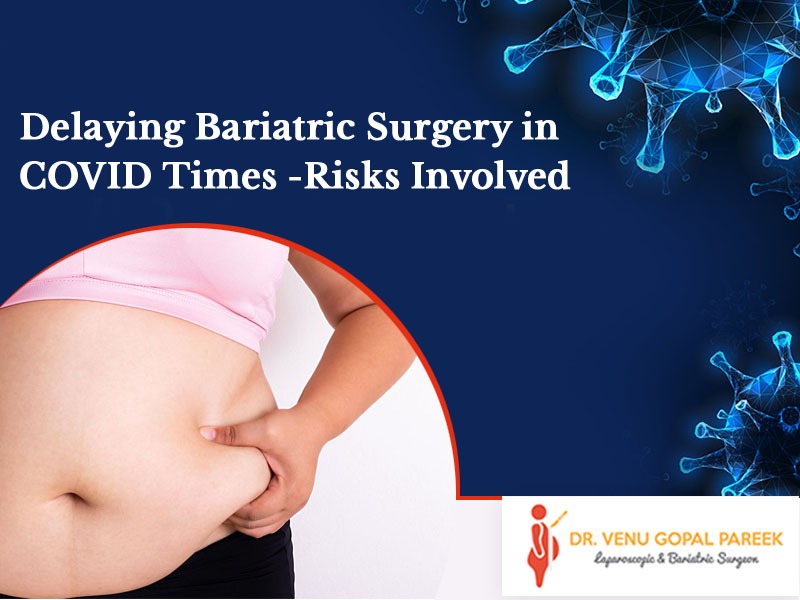
The world is dealing with a new virus known as Coronavirus Disease 19 or COVID-19. COVID-19 spreads rapidly from person-to-person via contact. It can stay alive and become infected on surfaces for several days. COVID-19 is causing our hospitals and health systems to be burdened by the number of people who are critically ill.
If you are overweight you may face a lot of health issues like sleep apnea, low metabolic rate, high blood pressure and diabetes etc, The best option for you is bariatric surgery (weight loss), and you are advised not to delay this very important procedure. You are vulnerable to this pandemic if you are overweight with medical conditions. Being overweight increases the risk of severe health complications, including COVID-19 infection.
Although bariatric surgery is not a procedure that requires immediate medical attention, it is a life-saving operation. By undergoing bariatric surgery, you can live a long, healthy life and be disease-free. Getting rid of excess weight can protect you from a variety of physical and mental ailments such as diabetes, cardiovascular disease, high blood pressure, insomnia, and depression. It can even lower cancer risk.
If you postpone bariatric surgery just because of the coronavirus pandemic, you need to reconsider that decision. Hospitals are medical personnel who are very alert to the coronavirus and have a particular medical team specifically for covid patients. There are isolated quarantine rooms and buildings for corona patients. Therefore, the coronavirus in hospitals is rarely exposed. This article provided by Dr Venu Gopal Pareek gives information about what happens if Delaying Bariatric surgery in covid times.
Bariatric surgery

Bariatric surgery is a lifesaver for many people struggling with extreme or painful obesity. As these procedures become more complex, safer, and more effective, they are likely to be used by physicians as an intervention in clinical medicine.
In the long term, 50% to 70% of patients who undergo this surgery are likely to maintain weight loss during the first five years. Suppose you have a BMI (Body Mass Index) of 40 or more. Your BMI is 35, and you have some severe health problems such as T2DM, high blood pressure, cardiovascular disease, or coronary artery disease. In this case, you are entitled to have bariatric surgery. You may have bariatric surgery even though your previous bariatric procedures were unsuccessful or ineffective.
Delaying Bariatric surgery in covid times -Risks Involved.

Bariatric and metabolic surgery to treat type 2 diabetes and obesity were halted during the pandemic covid 19. This will free up hospital capacity for COVID-19 and reduce the risk of infection for patients and staff. However, most of the doctors warned that delaying surgery can increase the risk of morbidity and mortality in patients awaiting surgery.
Social distancing and blocking guidelines can limit adherence to lifestyle interventions such as healthy eating and exercise, which can affect the health of affected patients. Compared with nonsurgical treatments, bariatric surgery results in more significant long-term results of weight loss, and reduces cardiovascular risk, remission from diabetes, and can improve survival.
Severe obesity, diabetes, and high blood pressure can all increase the risk of severe complications from Covid-19, and bariatric/metabolic surgery can improve these conditions dramatically and quickly. Therefore, delaying surgery could leave many people vulnerable to the severe consequences of SARS-Cov-2 infection.
Metabolic surgery is a potentially life-saving treatment for overweight people with type 2 diabetes. Obesity is a term that means you have a body mass index (BMI) of 30 or higher. Dr Venu Gopal Pareek recommends the following patients to get ready for bariatric surgery even in COVID 19 to avoid health risks:
- If there is a significant risk of diabetes complications such as cardiovascular disease or kidney failure
- Type 2 diabetes which requires insulin
- Poor control of blood sugar levels despite taking many drugs
- obesity (BMI> 35) or less severe obesity if there are at least three comorbidities, including liver, respiratory, kidney, or heart disease.
- You will need to lose weight and increase your metabolism for other time-sensitive treatments such as organ transplants.
- Standard access to bariatric and metabolic surgery can be maintained for patients who are unlikely to worsen within six months. However, these patients must be optimized with intensive medical care to maintain optimal control.
If you are not going to have bariatric surgery, you will experience the following problems:

People who are obese are at a higher risk of developing severe diseases and health conditions, including the following: compared to people of normal or healthy weight.
- All causes of death (mortality)
- High blood pressure (hypertension)
- High LDL cholesterol, low HDL cholesterol, or high triglyceride levels (dyslipidemia)
- Type 2 diabetes
- Coronary heart disease
- attack
- Gallbladder disease
- Osteoarthritis (damage to cartilage and bone in joints)
- Many types of cancer
- Mental disorders such as depression, anxiety
- Body aches and pains and difficulty with physical functions
- Heart disease and stroke
- Diabetes
- Gout
- Respiratory problems such as sleep apnea (when a person stops breathing for short periods during sleep) and asthma
Better to undergo surgery To avoid above risk with precautions:

Due to advances in medicine, bariatric surgery is now very safe and effective. With the help of laparoscopic surgery, doctors rarely use invasive techniques because laparoscopic surgery allows patients to recover faster. The hospitalization time is about 24 to 48 hours, and after a week or two, patients can come to the office with some precautions.
If you are ready to take proper precautions in the hospital, there is no need to delay bariatric surgery. Find experienced surgeons with bariatric surgery who are qualified and experienced. There are four types of bariatric surgery: sleeve gastrectomy, gastric bypass, duodenal switch, and modified duodenal switch. Make sure your doctor has extensive experience and understands all of these procedures. This will help you choose the procedure that is right for you.
You can protect yourself from unknown diseases through bariatric surgery. This helps with weight loss and ultimately causes resolution of other health problems. So don’t delay bariatric surgery just because of the covid pandemic. However, it is advisable to take some precautions such as: wearing a mask and using a disinfectant to protect against COVID-19.
Precautions:

Suppose a situation arises in which a bariatric patient needs to be hospitalized for an emergency surgical or endoscopic visit, and the patient is tested positive or is excluded for COVID-19. In that case, some additional precautions should be taken:
- Encourage anyone entering the facility to wear an N-95 mask or face covering.
- In cases of laparoscopy or cases where CO2 insufflation is used, ultrafiltration (smoke evacuation system) should be used.
- During insufflation, all CO2 escaped gas must be captured by the ultrafiltration system or, if available, the desulfation mode should be used.
- Surgery or endoscopy should be performed in a well-ventilated room.
- Staff must be trained regarding the use of proper personal protective equipment (PPE), including COVID-19 and non-COVID positive patients.
- Do strict cleaning and disinfection at facilities and in all rooms, including equipment and surfaces, often between patients.
- Do active screening of team members, patients and visitors (where permitted) as they enter the facility for temperature, symptoms and travel history.
- Every patient admitted to our hospital is tested for COVID-19.
- Continuous visitor restrictions.
- Social and physical distancing measures for everyone in our facilities – in all areas for employees and patients – such as minimizing waiting room time, moving chairs a minimum distance of 3 meters, marking floors with tape at appropriate intervals, and low maintenance. Patient flow to provoke the crowd.
- Follow strict hand hygiene and availability of hand disinfectant in all areas for staff and patients.
- Virtual communication to connect patients with loved ones.
The document also highlights general hygiene practices to protect against infection and prevent the spread of the virus, including:

- Cover coughs and sneezes with your elbow or handkerchief
- Dispose of tissue properly
- Wash your hands frequently with soap and water, including before and after eating and after using the toilet.
- Use of alcohol-based hand sanitizers
- Surface cleaning and disinfection
- When you are sick, avoid contact with other people and stay more than 1.5 meters from people
- Clean and disinfect commonly used items such as cell phones, keys and wallets
Conclusion:
Selective bariatric surgery should not be postponed until the COVID-19 pandemic is over as it leads to the above problems. It’s better to have surgery on time, and postoperative care can be provided via telemedicine. Patients ready for surgery must also be closely monitored, but remotely, to ensure long-term weight loss or maintenance. For best surgical care or endoscopic intervention, follow best practice guidelines.
Call Dr Venu Gopal Pareek at 091777 77715 for bariatric surgery and say NO Obesity in COVID 19.







